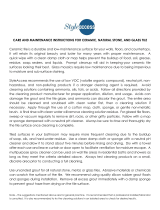
www.monoserra.com
CERAMIC ∙ PORCELAIN ∙ MOSAIC ∙ HARDWOOD ∙ LAMINATE FLOOR
Chemical Resistance
A tile sample is placed in a continuous contact with a variety of chemicals for 24 hours, rinsing
the surface and then examining the surface for visible variation.
Abrasion Resistance
The durability of a glazed tile is measured by observing the visible surface abrasion of the tile
when subjected to the testing procedure. This test method includes the following classification
system.
Class 0: Not recommended for use on floors
Class 1: Light Residential
Class 2: Medium to light traffic
Class 3: Medium to heavy traffic
Class 4: Commercial
Class 5: Heavy commercial
Cleaning and Maintenance of Wall and Floor Tile
Porcelain and Ceramic Glazed Tiles
Glazed porcelain and ceramic tiles required minimal maintenance. Products should be cleaned
routinely with an all-purpose, non-oil-based household or commercial cleaner. The product
chosen should also be grout joint cleaning compatible. The type of product may vary depending
on the tile application and use. A multipurpose spray cleaner, which removes soap scum, hard
water deposits, and mildew designed for everyday use, can be used on wall tile areas in
residential baths and showers. The entire area should be cleaned and scrubbed with cleaner
solution through the use of a cotton mop, cloth, sponge, or non-metallic brush. The entire area
should be rinsed with clean water to remove any cleaning solution residue. You should sweep
or vacuum floor areas prior to cleaning to remove any dust or debris. Routine cleaners should
never contain acids or ammonia. Acids can damage the grout and the glazed surface of the tile,
and ammonia can discolor the grout.
Porcelain and Ceramic Unglazed Tiles
Clean routinely with concentrated tile cleaners that have a neutral pH for safe regular use. The
product chosen should also be compatible with cleaning the grout joints at the same time.





